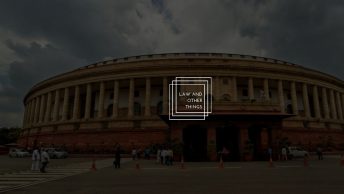This piece examines the recent move towards legal recognition of same-sex marriage and the petitions filed in different High Courts. it also elaborates on the divergent arguments made in favour of...
This piece discusses why India should institutionalise Shadow Cabinets. The author highlights benefits of the system, and responds to some common criticisms against the same.
Letter to Law Students - The Paradoxical Originality of Mahatma Gandhi by Prof. (Dr.) Nigam Nuggehalli
The article analyses the awful practice of the police parading the accused before the media and compelling the accused to pose for photographs. The author argues that this induces shame, creates...
In this article, the author analyses the validity of 'ordinance-making' in the country through the lens of the recent ordinances passed by the Uttar Pradesh government that curb various labour rights...
Organisers: Dr. Kalindi Kokal (IIT Bombay); Siddharth Peter de Souza (Justice Adda) Partner: Konrad Adenauer Stiftung India Office This workshop seeks to explore the ideas of justice that emerge from...
In this post our Senior Editor V. Venkatesan writes about the contempt case against the actor Suriya.
In early August, Law and Other Things turned fifteen. To mark that milestone, the editors have invited past and present contributors to share their reflections. This piece is the first in that series...
The students at The West Bengal National University of Juridical Sciences, Kolkata (‘NUJS’) are pleased to announce the release of Issue 13(2) of the NUJS Law Review.
In this article, the author critiques the proposed surrogacy law on the touchstone of fundamental rights. First,that commercial surrogacy is an occupation under Article 19(1)(g). Second, it argues...
In this letter, Prof. Nigam talks about the importance of the AGR Case for law students in the country, and makes a larger point towards how they should look at the law and its various facets.
In this piece, our Legal Reporter, Shravani analyses different articles written on the judicial career of Justice Arun Mishra who retired from the Supreme Court recently.
The Centre for Law and Policy Research (CLPR) is excited to announce the 5th edition of ConQuest: India’s Premiere National Quiz on the Indian Constitution, History and Politics. Over the last four...













